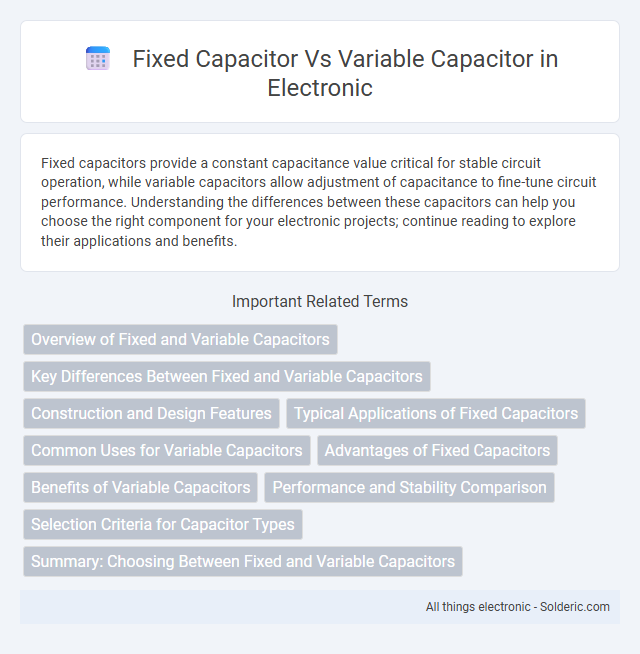Fixed capacitors provide a constant capacitance value critical for stable circuit operation, while variable capacitors allow adjustment of capacitance to fine-tune circuit performance. Understanding the differences between these capacitors can help you choose the right component for your electronic projects; continue reading to explore their applications and benefits.
Comparison Table
| Feature | Fixed Capacitor | Variable Capacitor |
|---|---|---|
| Capacitance | Constant, pre-defined value | Adjustable, variable within a range |
| Usage | Filtering, coupling, bypass circuits | Tuning circuits, frequency adjustment |
| Construction | Dielectric material fixed between plates | Movable plates to change capacitance |
| Cost | Generally low and stable | Higher due to mechanical parts |
| Reliability | High, fewer mechanical failures | Lower, prone to wear and misalignment |
| Size | Compact and stable | Typically larger due to adjustable mechanism |
| Applications | Signal filtering, power supply smoothing | Radio tuning, variable frequency oscillators |
Overview of Fixed and Variable Capacitors
Fixed capacitors offer a constant capacitance value determined by their construction, commonly used in filtering, timing, and coupling applications where stability is essential. Variable capacitors allow capacitance adjustment, enabling tuning and frequency selection in radios, oscillators, and antenna matching circuits. Key differences include the fixed capacitor's reliability and simplicity versus the variable capacitor's flexibility and precision control.
Key Differences Between Fixed and Variable Capacitors
Fixed capacitors have a predetermined capacitance value that remains constant, making them ideal for stable, precise applications like filtering or energy storage. Variable capacitors allow adjustment of their capacitance through mechanical or electronic means, enabling tuning in circuits such as radios or oscillators. Your choice depends on whether you require consistent capacitance for reliability or adjustable capacitance for flexibility in signal tuning.
Construction and Design Features
Fixed capacitors feature a solid dielectric material sandwiched between two conductive plates, providing stable capacitance with minimal variation. Variable capacitors incorporate adjustable plates or dielectric materials, allowing the capacitance to be altered by rotating or sliding components. Your choice depends on whether you need a constant capacitance for reliable performance or adjustable capacitance for tuning circuits.
Typical Applications of Fixed Capacitors
Fixed capacitors are commonly used in power supply filters, signal coupling and decoupling circuits, and timing devices due to their stable capacitance values and reliability. These capacitors find typical applications in electronic devices such as radios, televisions, and power regulators where consistent capacitance is essential. Unlike variable capacitors, fixed capacitors provide a precise and unchanging capacitance ideal for tuning frequencies, smoothing voltage, and storing energy in circuits.
Common Uses for Variable Capacitors
Variable capacitors are predominantly used in tuning circuits such as radio receivers and transmitters, allowing precise adjustment of resonant frequencies. They enable fine-tuning of oscillators and filters in RF applications, improving signal selectivity and performance. Common implementations include antenna matching networks, frequency modulation circuits, and voltage-controlled oscillators in communication devices.
Advantages of Fixed Capacitors
Fixed capacitors offer higher stability and reliability due to their consistent capacitance values, making them ideal for precision circuits and long-term applications. They generally exhibit lower equivalent series resistance (ESR) and better performance at high frequencies compared to variable capacitors. Fixed capacitors also tend to have a smaller size and cost advantage, making them suitable for compact and cost-sensitive electronic devices.
Benefits of Variable Capacitors
Variable capacitors offer precise tuning capabilities essential for applications such as radio frequency circuits and oscillators, enabling fine adjustments to capacitance values in real-time. Their adaptability allows for improved circuit performance by optimizing frequency response and impedance matching. Unlike fixed capacitors, variable capacitors enhance flexibility in design and maintenance, making them ideal for dynamic systems requiring frequent calibration.
Performance and Stability Comparison
Fixed capacitors offer superior performance in terms of stability and reliability due to their constant capacitance value, making them ideal for precision applications requiring minimal variation over temperature and frequency changes. Variable capacitors provide adjustable capacitance, which enhances flexibility but introduces variability and less predictable performance, especially in environments with fluctuating conditions. Your choice depends on whether consistent stability or tunable capacitance is more critical for your specific electronic circuit needs.
Selection Criteria for Capacitor Types
Selection criteria for fixed versus variable capacitors hinge on application requirements such as frequency stability, tuning range, and precision. Fixed capacitors offer stable capacitance values crucial for filtering and timing circuits, while variable capacitors provide adjustable capacitance essential for tuning radios and oscillators. Factors like capacitance tolerance, voltage rating, size, and cost also influence the choice between fixed ceramic, electrolytic, or film capacitors and variable air or trimmer capacitors.
Summary: Choosing Between Fixed and Variable Capacitors
Fixed capacitors offer stable capacitance values, making them ideal for circuits requiring precise and consistent performance, such as filtering and energy storage applications. Variable capacitors provide adjustable capacitance, allowing fine-tuning in tuning circuits, oscillators, and calibration tasks where flexibility is essential. Selecting the right capacitor depends on whether you need consistent capacitance or the ability to adjust your circuit's frequency response dynamically.
fixed capacitor vs variable capacitor Infographic

 solderic.com
solderic.com